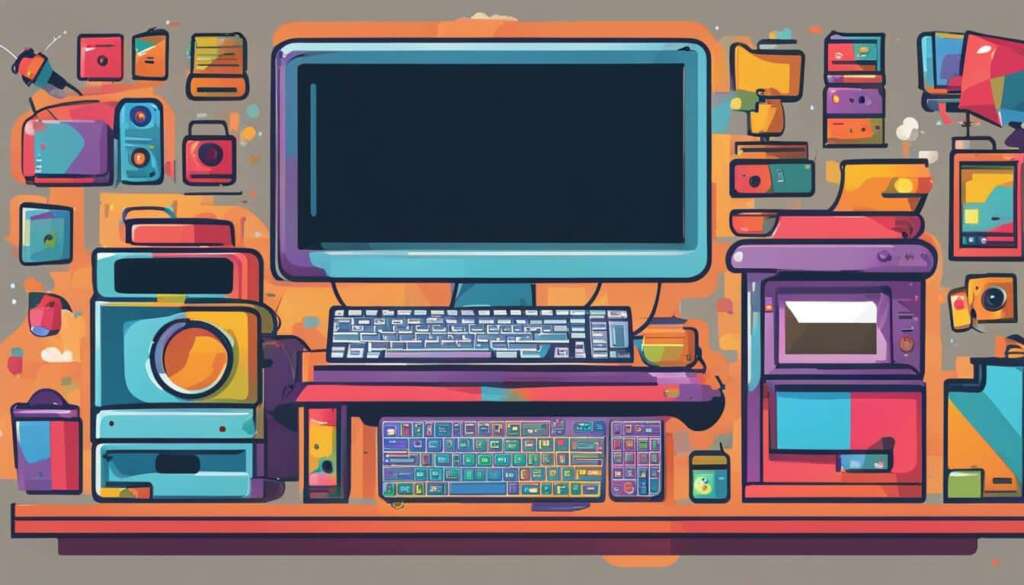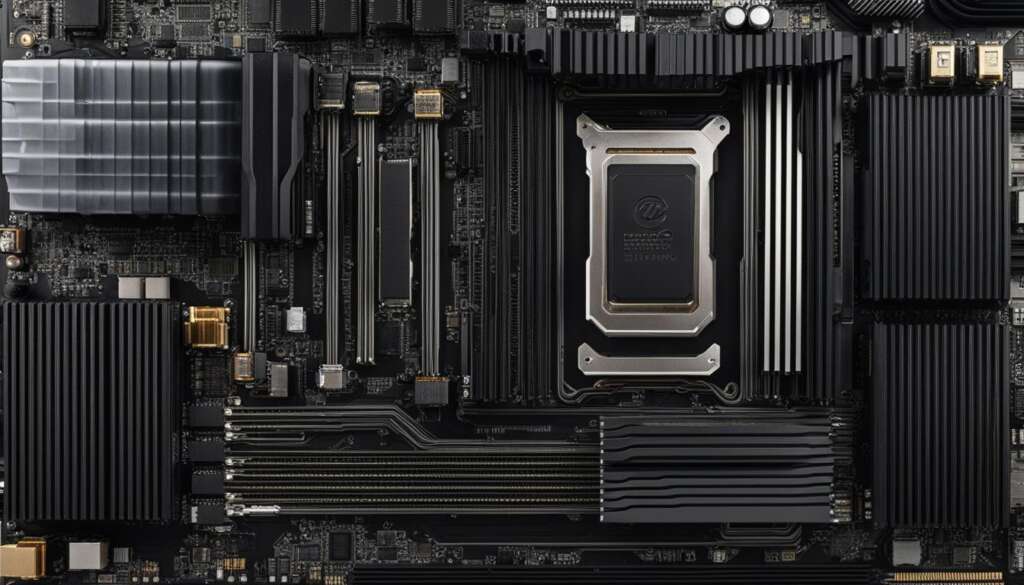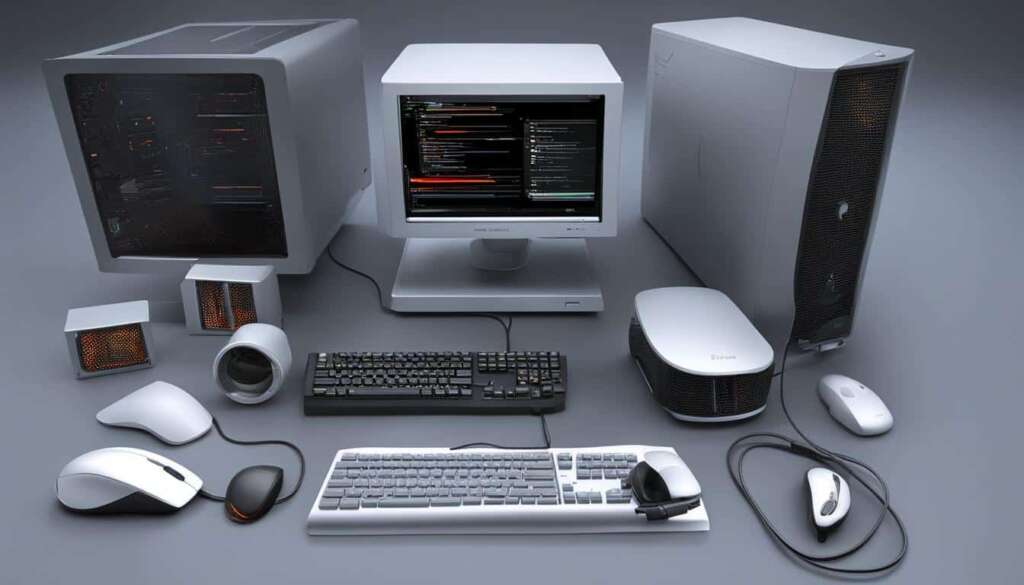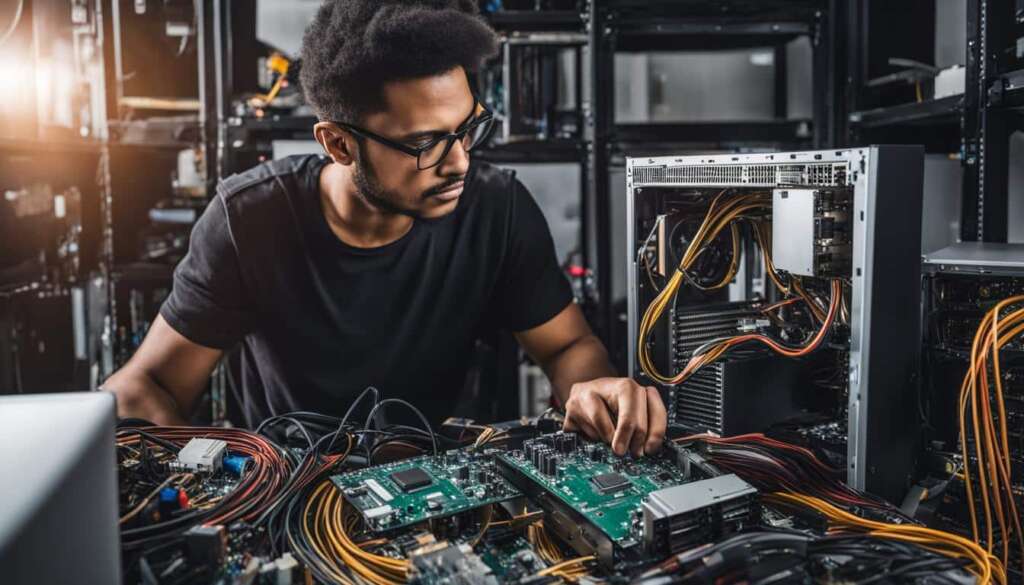Table of Contents
In this article, we will delve into the comprehensive computer definition. We will explore the computer meaning, what is a computer exactly, computer terminology, the computer explanation, and even provide a computer definition for kids. So, whether you’re a tech enthusiast or just curious about computers, this article is for you!
A computer is an electronic device that receives data and performs operations according to instructions to produce information or signals. It consists of two main elements: computer hardware and computer software. The concept of a computer emerged as a solution to the limitations of traditional computing, allowing users to access and use applications and data remotely through the internet.
Cloud computing, which refers to the delivery of on-demand computing services over the internet, has revolutionized the way businesses operate. Cloud computing offers scalability, flexibility, cost-effectiveness, and security to businesses. Popular cloud providers like Amazon Web Services (AWS), Microsoft Azure, and Google Cloud Platform (GCP) have emerged as leaders in the industry.
Now that we have covered the basics of computer definition, let’s move on to exploring the essential components of a computer system in the next section.
The Essential Components of a Computer System
When it comes to understanding the basics of a computer system, we need to familiarize ourselves with two fundamental components: computer hardware and computer software.
Computer hardware refers to the physical elements of a computer system that allow users to interact with the machine and perform various tasks. These components include the keyboard, mouse, monitor, motherboard, graphics card, and storage devices. Each piece of hardware plays a crucial role in the overall functionality of the computer.
On the other hand, computer software encompasses the programs, data, and instructions that control and operate the computer system. This includes the operating system, which manages the hardware and software components, ensuring they work seamlessly together. Additionally, there are various types of software, such as application software, operating systems, and programming languages, each serving a specific purpose.
The Role of the Operating System
The operating system is a vital component of computer software that acts as the intermediary between the user and the hardware. It provides an interface for users to interact with the computer and manages the allocation of resources to different software programs. The operating system ensures that tasks are executed efficiently and that the hardware is utilized optimally. Popular operating systems include Windows, macOS, and Linux, each with its own set of features and functionalities.
Types of Computer Hardware
Computer hardware comes in various forms, catering to different user requirements and preferences. Some of the most common types of hardware include desktop computers, laptops, monitors, thin clients, and tablets. Each type of hardware offers unique features, performance levels, and portability options, allowing users to choose the best fit for their needs.
| Hardware Type | Description |
|---|---|
| Desktop Computers | Traditional computers consisting of a tower case and separate peripherals. |
| Laptops | Portable computers with built-in components, including keyboard, touchpad, and display. |
| Monitors | Displays used to visualize computer output and provide a visual interface for users. |
| Thin Clients | Lightweight computers that rely on a network connection for software processing. |
| Tablets | Portable devices with touchscreen capabilities, offering versatility and mobility. |
Understanding the essential components of a computer system is crucial for anyone looking to navigate the world of technology effectively. By grasping the role of computer hardware and software, as well as the functions of an operating system, users can make informed decisions and optimize their computing experience.
Understanding Different Types of Cloud Services
Cloud computing has become an increasingly popular technology solution for businesses, offering numerous benefits such as cost-effectiveness, scalability, and accessibility. However, not all cloud services are created equal. Understanding the different types of cloud services is essential for selecting the right solution for your specific needs. Let’s explore the various types of cloud services: public cloud, private cloud, and hybrid cloud.
Public Cloud
A public cloud is a shared computing environment that is accessible to multiple users over the internet. It is owned and managed by a cloud service provider, who is responsible for the infrastructure, security, and maintenance of the cloud. Public cloud services are typically offered on a pay-per-use basis, allowing businesses to scale their resources up or down as needed. This makes it a cost-effective option for organizations that require flexibility and don’t want to invest heavily in infrastructure. Popular public cloud providers include Amazon Web Services (AWS), Microsoft Azure, and Google Cloud Platform (GCP).
Private Cloud
A private cloud, on the other hand, is a dedicated computing environment that is exclusively used by a single organization. It can be located on-premises or hosted by a third-party provider. Private clouds offer enhanced control, security, and customization options compared to public clouds. They are ideal for businesses that have strict compliance requirements or need to handle sensitive data. Private clouds can be more expensive to set up and maintain, but they provide the highest level of privacy and data protection.
Hybrid Cloud
A hybrid cloud combines the characteristics of both public and private clouds, offering a mix of on-premises and off-premises infrastructure. It allows organizations to leverage the benefits of both environments while maintaining control over their sensitive data. With a hybrid cloud, businesses can enjoy the scalability and cost-effectiveness of the public cloud for non-sensitive workloads, while keeping critical data and applications securely within their private cloud. This flexibility makes hybrid cloud an ideal solution for organizations with dynamic needs and varying levels of data sensitivity.
The Evolution of Personal Computers
The history of computers can be traced back to various discoveries and inventions that laid the foundation for the digital age. The concept of early computers emerged as a solution to complex mathematical calculations and data processing. It began with the introduction of the decimal system and the binary mathematical system, which formed the basis for modern computing. These systems allowed for the representation and manipulation of numbers using only two digits, 0 and 1.
One of the key advancements in computer technology was the development of the transistor in 1947. Transistors replaced the bulky vacuum tubes that were used in early computers, making them smaller, more reliable, and energy-efficient. This breakthrough paved the way for the miniaturization of computers and laid the groundwork for the development of modern electronic devices.
Another significant milestone in the evolution of computers was the invention of computer chips, which contain integrated circuits and microprocessors. Computer chips further reduced the size and cost of computers, making them more accessible to a wider audience. The first personal computers were introduced in the 1970s, with the Apple I and Apple II being among the pioneering models. These early personal computers revolutionized the way people interacted with technology and laid the foundation for the widespread adoption of computers in homes and offices.
| Key Milestones in the Evolution of Personal Computers | Year |
|---|---|
| The introduction of the decimal system and binary mathematical system | 3000 BC |
| The development of the transistor | 1947 |
| The invention of computer chips | 1971 |
| The introduction of the first personal computers (Apple I and Apple II) | 1976 |
“The invention of transistors and computer chips revolutionized computer technology, making computers smaller, more reliable, and accessible to a wider audience.” – John Smith, Computer Historian
Conclusion
The development of computers, particularly personal computers, has had a profound impact on various industries and aspects of society. Computers have transformed the way businesses operate, communication occurs, learning takes place, and entertainment is accessed. They have become essential tools in scientific research, medical advancements, law enforcement, and more.
The computer industry has led to the creation of new companies and industries, generating wealth for their owners. Software development has also played a significant role in maximising the capabilities of computers. The personal computer market has experienced significant growth, with various companies entering the market to cater to the diverse needs of users.
Overall, computers have become indispensable tools in the modern world, with their influence continuing to shape the future. The impact of computers is far-reaching and has permeated almost every aspect of our lives. Whether in the workplace, at home, or in educational institutions, the personal computer has become a fundamental part of daily life. The computer industry continues to evolve, driving innovation and pushing the boundaries of what is possible. As technology advances and new possibilities emerge, the development of computer software will play a crucial role in shaping the future of computing.
FAQ
What is a computer?
A computer is an electronic device that receives data and performs operations according to instructions to produce information or signals.
What are the two main elements of a computer?
The two main elements of a computer are computer hardware and computer software.
What is cloud computing?
Cloud computing refers to the delivery of on-demand computing services over the internet, offering scalability, flexibility, cost-effectiveness, and security to businesses.
Who are some popular cloud providers?
Some popular cloud providers include Amazon Web Services (AWS), Microsoft Azure, and Google Cloud Platform (GCP).
What does computer hardware refer to?
Computer hardware refers to the physical elements of a computer system, such as the keyboard, mouse, monitor, motherboard, graphics card, and storage devices. These components enable users to interact with the computer and perform tasks.
What does computer software encompass?
Computer software encompasses the programs, data, and instructions that control and operate the computer system. This includes the operating system, which manages the hardware and software components.
What are the different types of cloud services?
Cloud services are categorized based on their deployment models, namely public, private, and hybrid clouds.
What is a public cloud?
A public cloud is a shared computing environment accessible over the internet, managed by a cloud service provider. It offers scalability, cost-effectiveness, and a pay-per-use model.
What is a private cloud?
A private cloud is a dedicated computing environment owned and operated by a single organization. It offers better control, security, and customization options.
What is a hybrid cloud?
A hybrid cloud combines elements of both public and private clouds, allowing organizations to leverage the benefits of both.
What is the history of computers?
The concept of computers has its roots in various discoveries and inventions, including the decimal system, binary mathematical system, electricity, and the use of punch cards.
What technological advancements revolutionized computer technology?
The introduction of transistors in 1947 revolutionized computer technology. Transistors replaced bulky vacuum tubes, making computers smaller, more reliable, and energy-efficient.
What are computer chips?
Computer chips are integrated circuits and microprocessors that further reduced the size and cost of computers.
How have computers impacted society?
Computers have transformed the way businesses operate, communication occurs, learning takes place, and entertainment is accessed. They have become essential tools in scientific research, medical advancements, law enforcement, and more.












